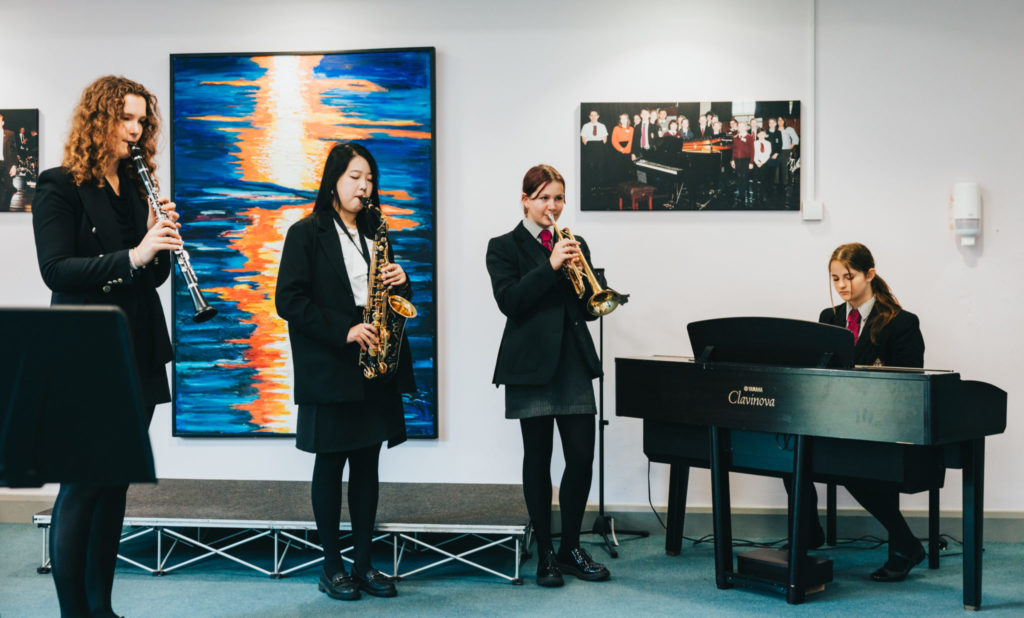AN UNMISSABLE SIXTH FORM
WELCOME
At King William’s College Sixth Form, we provide an unmissable Sixth Form experience, bespoke to each and every pupil. Our three distinct academic pathways are tailored to students’ individual needs and ambitions as they start to look to life beyond senior school. Students become a part of our vibrant, busy and supportive community and have access to extensive enrichment and extracurricular programmes, which foster self development to set students up for successful futures.

WHY CHOOSE SIXTH FORM AT KWC?
- Strong and supportive community.
- Extensive tutorial programme with average tutor groups and class sizes of 10 pupils.
- A pupil-teacher ratio of 1:8.
- Close personal support and academic mentoring, allowing for more individual tailored guidance.
- Collaborative and interactive student and teacher relationships.
- Focus on developing skills so students can guide their own learning experiences, setting them up for the next steps.
- New and varied opportunities to extend experiences, develop skills and move out of their comfort zones.
- A spacious Sixth Form Centre, with a range of comfortable and calm study and social spaces, including a kitchen area.
- Attendance at a variety of Sixth Form events, including our lecture series and Epiphany and Valedictory Dinners.
- An extensive enrichment programme with opportunities including Charity Challenge, Junior Achievement Company Programme, Model United Nations, Peer Mentoring, Share Race and the Duke of Edinburgh’s Gold Award.
- A varied and extensive extracurricular provision where students will embrace new experiences, and have the opportunity to take a more active leadership role, acting as role models to their younger peers.
- Key focus on teamwork, responsibility, community service and leadership, where students will hold House, Captain, CCF, Ambassador and Praepositor positions, organise events and take advantage of public speaking opportunities.
Our Sixth Formers
Our Sixth Form nurtures the development of well-rounded young people with a strong sense of values and a broad skills base, whose varied experiences enable them to be successful in the future. They develop:
- Aspirations
- Discipline
- Strong work ethic
- Confidence
- Mutual respect and support
- Inclusion
- Positivity
- Enthusiasm
- Global Citizenship
- A sense of belonging

Although the IB programme was challenging, it is one of my proudest achievements to this day and I value the education I received, both through the IB and from KWC. It has been the best possible preparation for life beyond school.
OUR ACADEMIC PATHWAYS
Our three distinct academic pathways are tailored to students’ individual needs and ambitions as they start to look to life beyond senior school.
Through our teaching of the International Baccalaureate (IB) Diploma, International Baccalaureate Courses and Business and Technology Education Council (BTEC) qualifications, our pupils have the flexibility to be able to choose the best next step for them, whether they are considering university or employment.
Our programmes are taught over two years and provide students with:
- Broad set of skills;
- Breadth and depth of study;
- Ability to think critically and solve complex problems;
- Independent learning skills;
- International perspective and cultural awareness;
- Ability to engage with people in an increasingly globalized, rapidly changing world;
- Experience of new activities;
- A tried, tested and stable qualification.
PATHWAY 1 - THE IB DIPLOMA
In 2002, King William’s College began teaching the International Baccalaureate Diploma. Since then more than 1,000 students have studied the Diploma with us and we have become one of the largest and most successful IB schools in the British Isles. The entry requirement is six (I)GCSEs grade C or above or equivalent.
The IB Diploma is a balanced programme of education that combines both breadth and depth of study. It places a strong emphasis on critical thinking skills and promotes a sense of international-mindedness. As there are nine components in all, IB students learn how to organise themselves, think independently and take responsibility for their own learning.
SIX ACADEMIC SUBJECTS
Students study six subjects, normally three at higher level (HL) and three at standard level (SL). They choose one subject from each of Groups 1 to 5, which includes languages, the humanities, science and mathematics. The sixth subject may be an arts subject chosen from Group 6 or another subject from Groups 1 to 4.
In addition, the programme has three core requirements that are included to broaden the educational experience and challenge students to apply their knowledge and understanding:
THE EXTENDED ESSAY
A 4,000 word piece of independent research, gives students the opportunity to conduct an in-depth study of a topic of interest to them. It introduces them to academic research and is an invaluable preparation for university.
THEORY OF KNOWLEDGE
A course designed to encourage each student to reflect on the nature of knowledge by critically examining different ways of knowing (sense, perception, emotion, language, reason, faith, imagination, intuition, memory) and different kinds of knowledge (for example, scientific, artistic, mathematical and historical).
CREATIVITY, ACTIVITY AND SERVICE
Requires that students actively learn from the experience of doing real tasks beyond the classroom. Students can combine all three components or do activities related to each one of them separately.
PATHWAY 2 - IB COURSES
- Pupils can study several Higher Level courses instead of the full Diploma.
- This will accrue UCAS points, enabling access to some universities.
- Instead of the nine IB components, pupils can therefore do three to six, depending on their choices.
Benefits of the course include:
- More independent study time;
- Heightened focus on individual interests;
- Opportunity to take part in aspects of the core;
- Excellent and varied activities programme.

I would recommend the IB to anyone. It provides you with a full and well-rounded education with the benefit of learning within an international community.
PATHWAY 3 - BTEC PLUS
New for September 2024 – subject to demand.
- BTECs (Business and Technology Education Council) are specialist work-related qualifications.
- Practical, hands-on learning as well as theory.
- Modular assessment plus some exams.
- BTEC Nationals Level 3 are of a similar standard to A levels and well regarded by universities, FE colleges, employers.
- They can lead to employment, continuing study, or professional development programmes.
- BTEC Diploma (equivalent to two A Levels) plus two Higher Level IB subjects and Creativity, Activity and Service component.

HEAR FROM OUR COMMUNITY
IB DIPLOMA Vs A Levels
IB students are given a unique, challenging and diverse education and consistently demonstrate the critical thinking and research skills needed to excel in life.
| DEVELOPMENT OF SKILLS | IB DIPLOMA | A LEVELS |
|---|---|---|
| Encouraging independent enquiry | 95% | 48% |
| Developing in-depth subject expertise | 84% | 90% |
| Developing workplace skills | 18% | 5% |
| Developing ability to cope under pressure | 58% | 40% |
| Nurturing an open mind | 82% | 23% |
| Developing self-management skills | 84% | 29% |
| Encouraging citizenship | 71% | 1% |
| Nurturing communication skills | 66% | 42% |
| Developing intercultural skills | 74% | 5% |
| Propensity to complete their degree | 86% | 82% |
| Likelihood to contribute to the research life of the university | 60% | 55% |
EXAM RESULTS AND DESTINATIONS 2023
(I)GCSEs
Our 59 (I)GCSE Year 11 students achieved an overall pass rate (9-4 or A*-C) of 87%, with 37% of grades at 9-7 or A*/A.
Figures released by the Isle of Man Department of Education, Sport and Culture (DESC) for (I)GCSEs in 2023 are 72% at A*-C and 21% A* to A.
INTERNATIONAL BACCALAUREATE DIPLOMA
The year group of 57 students achieved an average of 32 points. One student achieved the maximum of 45 points and nine students achieved 40 or more points out of a maximum of 45, putting them in the top 10% of students worldwide.
UNIVERSITY DESTINATIONS
HEAR FROM OUR ALUMNI
THE BRIEN MUSICAL SCHOLARSHIP
Through a very generous bequest, King William’s College is offering a Sixth Form Bursary up to 100% of the tuition fees for a musically talented young person to study the International Baccalaureate and, hopefully, ultimately undertake further education in musical studies.
The Brien Musical Scholarship is a means-tested scholarship and is eligible for new applicants for September 2024. It will be awarded to a candidate who can demonstrate enthusiasm and commitment to Music and the successful student will be expected to undertake IB Music, preferably at Higher-Level, in addition to contributing to the musical life of College.

BEYOND THE CLASSROOM
An education begins inside the classroom, but does not end there. An essential dimension to a rounded education are the learning experiences outside of the classroom. We enrich the academic experience of all our students through experimental learning and the opportunity to try new challenges.